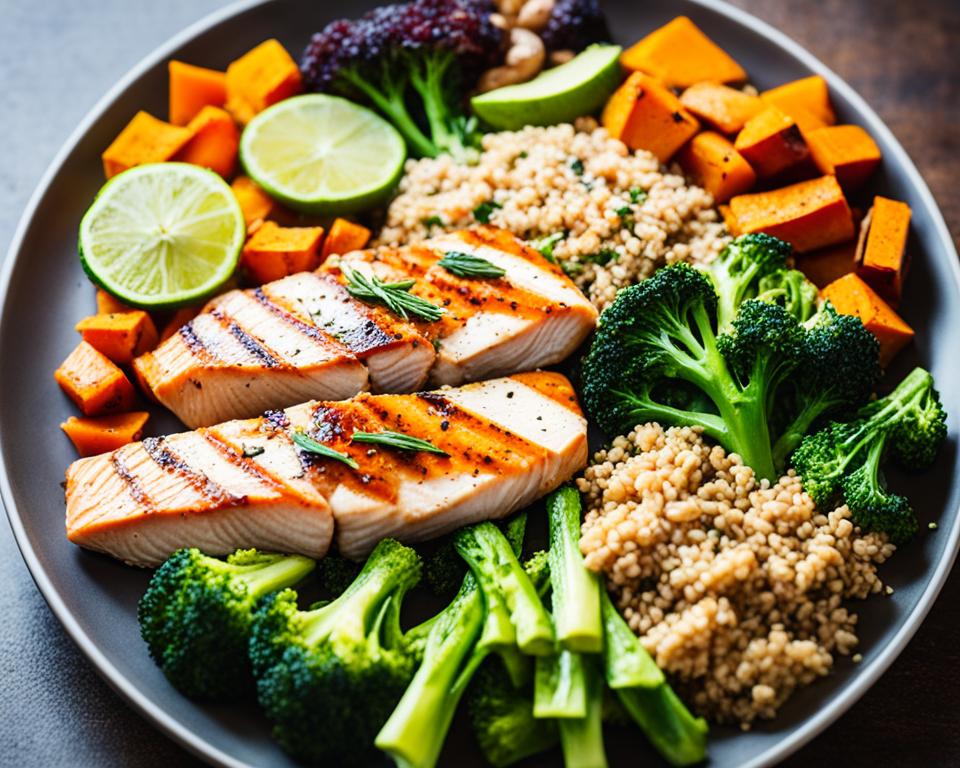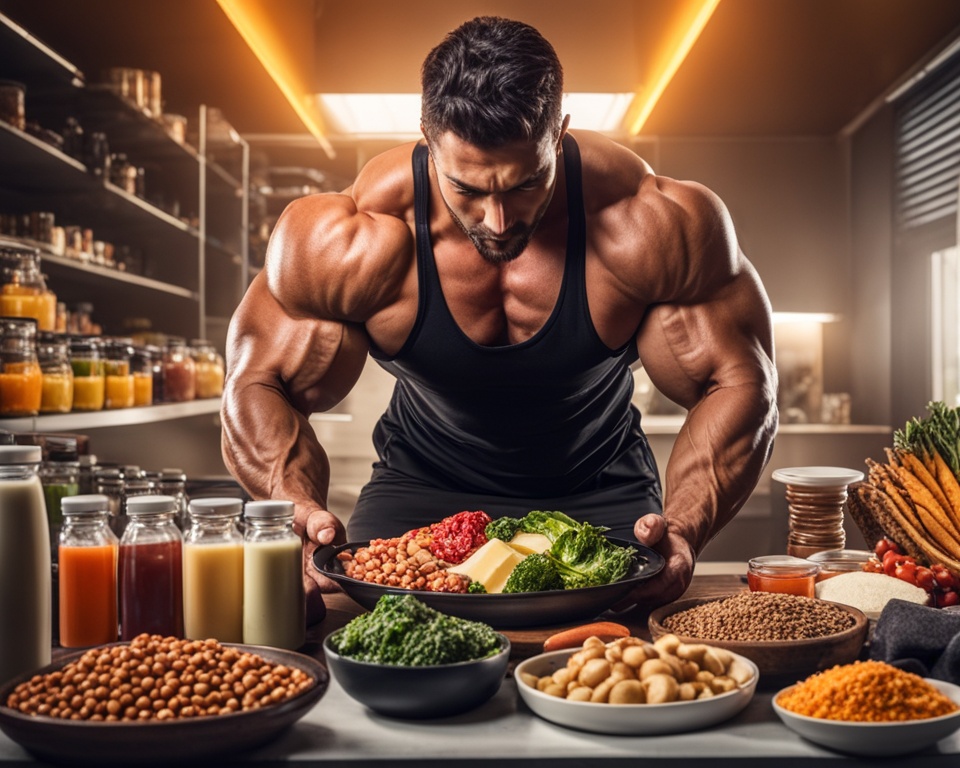As a fitness enthusiast, you know that proper nutrition is the foundation for building a strong, lean physique.
Your diet can make or break your results at the gym. Just ask Alex, a dedicated bodybuilder who spent years fine-tuning his nutrition strategy.
When Alex first started his bodybuilding journey, he followed a generic “bro science” approach, chowing down on protein shakes and chicken breasts, day in and day out.
While he saw some progress, he hit a plateau and struggled to take his physique to the next level.
It wasn’t until he started focusing on nutrient density, calorie and macronutrient balance, and strategically timed his nutrition around his workouts that he truly unlocked his full potential.
Now, Alex is a testament to the power of optimized workout nutrition. By aligning his diet with his training, he’s been able to build an impressive, competition-ready physique.
His story is a reminder that your nutrition plan is just as important as your workout routine when it comes to achieving your fitness goals.
Understanding Bodybuilding Nutrition Phases
Building an impressive, muscular physique is a journey that involves strategically managing your nutrition through distinct phases. Two critical phases in the bodybuilding process are the bulking phase and the cutting phase. Understanding these phases is essential for achieving your muscle-building and fat loss goals.
Bulking Phase
The bulking phase is a period focused on gaining muscle mass. During this phase, bodybuilders consume a calorie-surplus diet, meaning they eat more calories than their body needs to maintain its current weight. This calorie surplus, combined with intense weight training, provides the necessary nutrients and energy for the body to build new muscle tissue. The goal is to maximize muscle growth while minimizing fat gain.
To effectively bulk, you should aim to increase your calorie intake by about 15% above your maintenance level. For example, if you typically consume 3,000 calories per day to maintain your weight, you would increase your daily intake to around 3,450 calories (3,000 x 1.15) during the bulking phase.
Cutting Phase
After the bulking phase, the focus shifts to the cutting phase, where the goal is to lose excess body fat while preserving the muscle mass gained during the bulking period. This involves a calorie-deficit diet, where you consume fewer calories than your body needs to maintain its current weight.
To transition from a bulking to a cutting phase, you should decrease your maintenance calories by approximately 15%. In the previous example, your daily calorie intake would decrease from 3,450 calories to 2,550 calories (3,000 x 0.85) during the cutting phase.
By understanding and properly executing these bodybuilding nutrition phases, you can effectively build muscle, lose fat, and achieve your desired physique goals.
Calculating Calorie and Macronutrient Needs
Determining your optimal calorie and macronutrient intake is a crucial step in achieving your fitness goals, whether you’re looking to build muscle or burn fat. The easiest way to figure out your calorie needs is to weigh yourself at least three times a week and track your daily food intake using a calorie-counting app. If your weight remains stable throughout the week, then the number of calories you’re consuming is considered your “maintenance” level.
Once you have your maintenance calorie level, you can adjust it accordingly based on your specific goals. For muscle building, you’ll generally want to consume a slight calorie surplus of 300-500 calories above maintenance. For fat loss, you’ll want a calorie deficit of 300-500 calories below maintenance. Your macronutrient ratio, which is the balance of protein, carbs, and fat, will remain the same regardless of whether you’re in a bulking or cutting phase.
A typical bodybuilding-style diet includes 30-35% of calories from protein, 55-60% from carbs, and 15-20% from fat. This ratio helps to support muscle growth and recovery while also providing enough energy from carbohydrates and a moderate amount of healthy fats.
| Macronutrient | Percentage of Total Calories |
|---|---|
| Protein | 30-35% |
| Carbs | 55-60% |
| Fat | 15-20% |
By carefully calculating your calorie needs and macronutrient ratio, you can create a nutrition plan that supports your specific fitness goals and helps you achieve the desired results.
Nutrient-Dense Foods for Muscle Growth and Fat Loss
When it comes to building muscle and burning fat, your dietary choices play a crucial role. While the overall calorie and macronutrient balance are essential, prioritizing nutrient-dense foods can significantly enhance your results. Whether you’re in a bulking or cutting phase, focusing on the right foods can help support your fitness goals.
Foods to Prioritize
To fuel your muscle growth and fat loss journey, aim to incorporate these nutrient-dense foods into your diet:
- Lean protein sources like meats, poultry, and fish to support muscle building and repair.
- Dairy products such as Greek yogurt and cottage cheese for their high-quality protein and essential nutrients.
- Whole grains like oats, quinoa, and brown rice for complex carbohydrates that provide sustained energy.
- Fruits and starchy vegetables like sweet potatoes and bananas for complex carbs, vitamins, and minerals.
- Non-starchy vegetables such as spinach, broccoli, and bell peppers for their abundance of fiber, vitamins, and antioxidants.
- Nuts and seeds for their healthy fats, protein, and fiber.
- Beans and legumes for their complex carbs, fiber, and plant-based protein.
Foods to Limit or Avoid
While you can enjoy a balanced diet, it’s essential to limit or avoid certain foods that may hinder your muscle growth and fat loss efforts:
- Alcohol, as it can negatively impact muscle building and fat loss.
- Added sugars found in processed foods, which provide empty calories without much nutritional value.
- Deep-fried foods, which may contribute to inflammation and other health concerns.
Additionally, it’s best to avoid heavy, high-fat meals before your pre-workout as they can slow down digestion and cause discomfort during your training session.
Workout Nutrition Plans for Men
Designing a comprehensive workout nutrition plan is essential for men aiming to build muscle, lose fat, and optimize their athletic performance. While traditional bodybuilding diets may be limited in food variety, it’s crucial to incorporate a balanced diet rich in essential nutrients to support your fitness goals.
A well-rounded sample meal plan should include a variety of nutrient-dense foods to ensure your body receives the necessary balanced diet of protein, complex carbohydrates, healthy fats, and micronutrients. By focusing on nutrient variety, you can fuel your workouts, support muscle growth, and promote overall health.
| Meal | Foods |
|---|---|
| Breakfast | Oatmeal with berries, Greek yogurt, and almonds |
| Snack | Apple with peanut butter |
| Lunch | Grilled chicken breast, quinoa, and roasted vegetables |
| Snack | Cottage cheese with sliced cucumber and cherry tomatoes |
| Dinner | Salmon, sweet potato, and steamed broccoli |
This sample meal plan provides a balanced combination of protein, complex carbohydrates, and healthy fats to support your workout routines and overall health. By incorporating a variety of nutrient-dense foods, you can ensure your body receives the necessary vitamins, minerals, and other essential nutrients to fuel your fitness journey.

Nutritional Supplements for Active Men
As part of a comprehensive fitness regimen, many active men turn to dietary supplements to support their goals. Three popular supplements that can provide benefits for bodybuilders and athletes include whey protein, creatine, and caffeine.
Whey Protein
Whey protein is a popular supplement among bodybuilders and athletes looking to increase their protein intake. Derived from milk, whey protein is a high-quality, complete protein that contains all the essential amino acids needed for muscle growth and recovery. Adding a scoop or two of whey protein powder to a smoothie or shake can be a convenient way to boost your protein consumption, especially on days when it’s difficult to meet your protein needs through whole food sources alone.
Creatine
Creatine is another well-researched supplement that can enhance athletic performance and muscle building. It works by providing your muscles with a readily available source of energy, which can help you eke out an extra rep or two during your workouts. While there are various forms of creatine available, creatine monohydrate is considered the most effective and well-studied version.
Caffeine
Finally, caffeine is a stimulant that can help combat fatigue and increase focus during workouts. Many pre-workout supplements contain high levels of caffeine, but you can also get a caffeine boost from sources like coffee, tea, and energy drinks. By enhancing mental alertness and energy levels, caffeine can help you push through those grueling training sessions and maximize the effectiveness of your workouts.
Remember, while these supplements can provide valuable support, they should be used in conjunction with a balanced, nutrient-dense diet and a well-designed exercise program. Always consult with a healthcare professional before incorporating any new supplements into your routine.

Conclusion
Bodybuilding can provide significant benefits of bodybuilding, but it’s important to be aware of the potential risks as well. Regular resistance training helps build muscle strength and size, which is linked to a lower risk of dying from cancer, heart disease, and kidney disease. Incorporating aerobic exercise, as bodybuilders often do to reduce body fat, can also improve heart health and significantly lower your risk of developing or dying from heart disease.
However, maintaining extremely low levels of body fat can negatively impact your sleep and mood. Additionally, the use of anabolic steroids, sometimes employed in the bodybuilding community, can have adverse effects on your overall health. It’s crucial to approach your bodybuilding journey with a balanced and sustainable mindset, prioritizing your long-term well-being alongside your fitness goals.
By understanding the importance of proper nutrition, incorporating a variety of exercises, and being mindful of potential risks, you can maximize the benefits of bodybuilding while mitigating the potential risks. Remember, a holistic approach to your health and fitness is key to achieving sustainable success in the world of bodybuilding.
FAQ
How important is diet for achieving results in the gym?
How do bodybuilding diets differ from other strength training diets?
What are the different phases of a bodybuilding diet?
How do you determine your calorie and macronutrient needs for bulking and cutting?
What types of foods should you prioritize and limit in your bodybuilding diet?
How can you ensure you get adequate nutrition on a bodybuilding diet?
What are some common nutritional supplements used by bodybuilders?
Source Links
- https://www.healthline.com/nutrition/bodybuilding-meal-plan
- https://www.healthline.com/nutrition/workout-routine-for-men
- https://www.muscleandfitness.com/nutrition/healthy-eating/28-days-meal-plan-lean-muscle/
